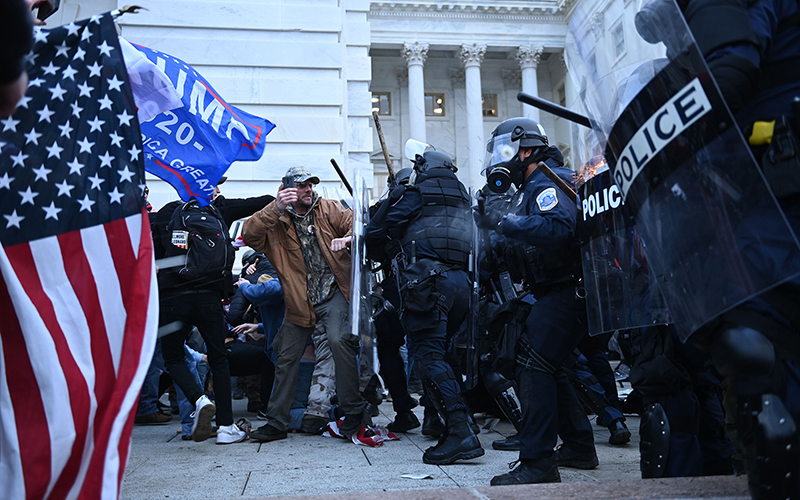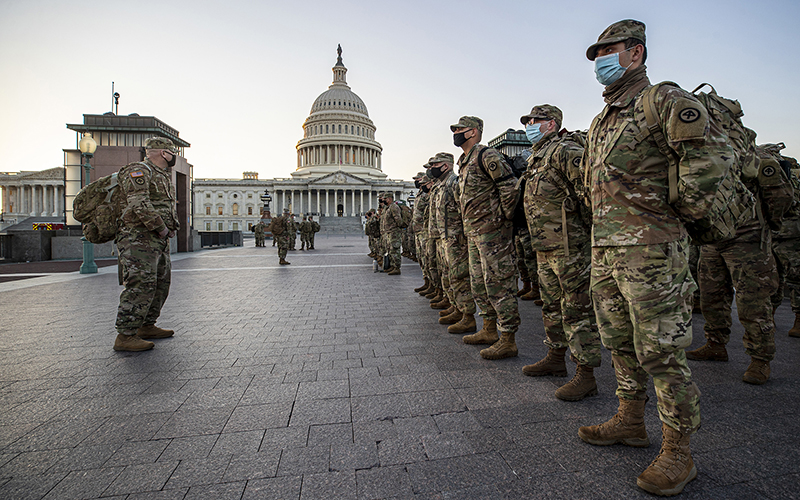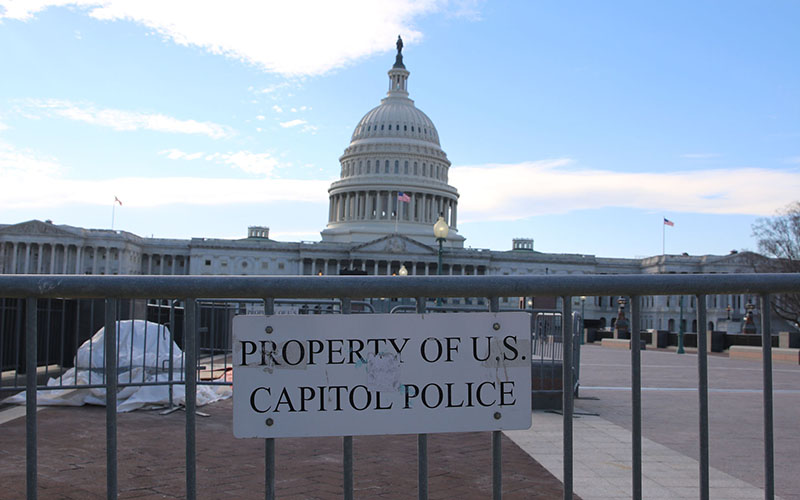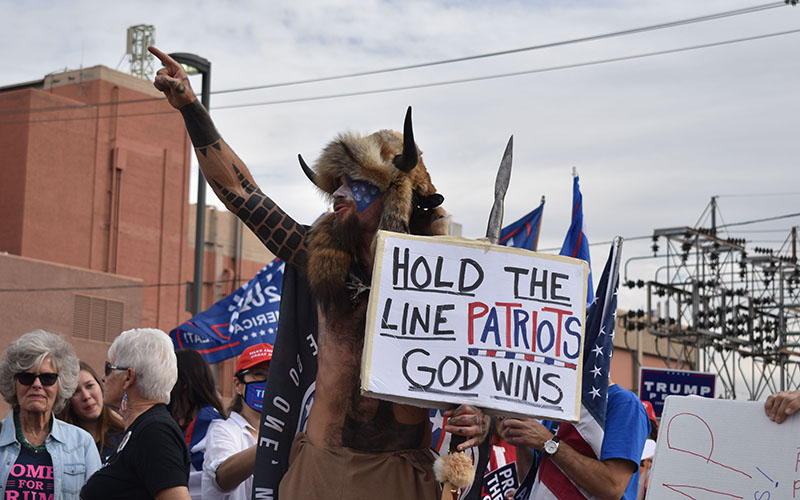
Rioters clash with police and security forces outside the Capitol on Jan. 6, after thousands of then-President Donald Trump’s supporters marched from a “Stop the Steal” rally to the Capitol where lawmakers were certifying President Joe Biden’s election. Several Arizona officials have been subpoenaed by the House committee investigating that assault. (Photo by Brendan Smialowksi/ AFP via Getty Images)
WASHINGTON – The House committee investigating the Jan. 6 attack on the Capitol will start presenting evidence Thursday night from more than 1,000 witnesses – including a number of prominent Arizona Republicans.
In addition to the nine Arizonans indicted in the actual Capitol breach, at least five GOP officials from the state are among 100 people reportedly subpoenaed over the past year by the Select Committee to Investigate the Jan. 6 Attack on the U.S. Capitol.
The committee began its work last year with dramatic testimony from police injured in the attack, and it was scheduled to pick up Thursday with a prime-time hearing that will be the first of at least eight sessions that outline “a coordinated, multi-step effort to overturn the results of the 2020 election.”
Thursday’s hearing featured testimony from a U.S. Capitol Police officer who was injured in the attack and a documentary filmmaker who was following members of the Proud Boys.
It was not likely to include participation from Rep. Andy Biggs, R-Gilbert, one of five GOP House members who have refused to cooperate with subpoenas from the committee. Biggs has called the committee and its work a “baseless witch hunt,” and “pure political theater.”
“The illegitimate Jan. 6 hearing this week is a distraction from the Biden Admin’s colossal domestic and international failures,” Biggs said in a tweet Tuesday.
That was echoed Thursday by House Minority Leader Kevin McCarthy, R-Calif., and other House GOP leaders who called the committee “the most political and least legitimate committee in American history.”
“It has used congressional subpoenas to attack Republicans, violate due process, and infringe on the political speech of private citizens,” McCarthy said of the committee.
McCarthy, who has also ignored a committee subpoena, called the hearings “a smoke screen for Democrats to push their radical agenda,” and said Republicans will be issuing their own alternative report on the hearings.
But Democrats like Rep. Raul Grijalva, D-Tucson, said the hearings are needed to “shed light on the dark actions of that day,” which he called part of a “fascist attempt to, by force and lies, overturn a legitimate election.”
“These hearings are for a matter of public record so that we may never forget what happened,” Grijalva said in a statement Wednesday.
The committee of seven Democrats and two Republicans was formed last summer to investigate the Jan. 6, 2021, violent attack on the Capitol that led to seven deaths, including three police officers, according to a June Senate report on that day.
The assault followed a “Stop the Steal” rally outside the White House where then-President Donald Trump urged the crowd to march on the Capitol where Congress was about to certify the election that made Joe Biden president.

New Jersey National Guard members muster at the Capitol days after a mob stormed the building on Jan. 6. The riot comes at a time when the political divide is widening and threats against elected officials are steadily rising. (Photo by Master Sgt. Matt Hecht/New Jersey National Guard)
Thousands marched down the National Mall and quickly overwhelmed Capitol Police to break into the building. That sent lawmakers, including Vice President Mike Pence, scrambling for safety and disrupted the election certification for hours until authorities could regain control.
Numerous investigations have found little evidence of the 2020 elections to be fraudulent, including an investigation by the Arizona attorney general’s office that found that though there were some voting irregularities, there was no indication of widespread fraud on the report.
The committee asked Biggs on May 2 to discuss his reported participation in White House planning meetings for Jan. 6, his efforts to encourage state lawmakers to overturn the election and an alleged request for a pardon from Trump before he left office. It subpoenaed him on May 12, after he did not respond to the request to discuss his involvement.
Biggs was just one of a number of Arizonans targeted for questioning by the committee, which has also issued subpoenas to Arizona Republican Party Chairwoman Kelli Ward, Arizona Rep. Mark Finchem, R-Tucson, and Loraine Pellegrino and Nancy Cottle, officers of the Arizona Federation of Republican Women.
Finchem, who was at the Jan. 6 rally and continues to insist the election was stolen from Trump, is currently running for secretary of state. He has pushed claims that the election was “rigged” and the American people “robbed.”
The committee wants to talk to Finchem about his involvement in Jan. 6 planning as well as the creation of a set of “alternate electors,” a list that was sent to Washington in an effort to cast the state’s 11 electoral votes for Trump.
Ward was also subpoenaed over the alternate elector list, as were Pellegrino and Cottle, who claimed to be alternate electors. Others on the list who have not been subpoenaed include Arizona Rep. Jake Hoffman, R-Queen Creek, and Jim Lamon, a candidate for the GOP nomination for U.S. Senate.
It is not clear if the others complied with the subpoenas. Neither Finchem nor Ward returned calls seeking comment, but Ward and her husband went to court seeking to block committee access to their phone records as part of the subpoena.
The committee sought Ward’s phone records after it was reported that she spoke to Trump and his staff about election certification issues. Besides signing as an alternate elector, along with her husband, Ward also reportedly texted “stop the counting” after Biden was declared winner.
Aaron Marquez, executive director of Vets Forward, said that those subpoenaed “certainly” have a Fifth Amendment right not to testify, “but we should hold our members of Congress to a higher standard.”
“If you’re an elected official, if you’re pleading the Fifth, there’s probably something that he would not want to criminally incriminate himself for,” he said of Biggs.
Marquez also said it is important to watch the hearing and hold people accountable for activities that led to the attack and the conspiracy in our country to try to overturn the will of the voters.
Separate from the committee’s investigation is the Justice Department probe into the insurrection, that has so far led to 840 arrests in all 50 states, on charges ranging from “parading, demonstrating or picketing in a Capitol building” to assault and seditious conspiracy.
Nine of those charged are from Arizona, the most notable being Jacob Chansley, also known as the QAnon Shaman, easily recognized for his face paint and horn-and-fur getup. He pleaded guilty to obstruction of an official proceeding and was sentenced in November to 41 months in prison and three years of probation.
Another Arizona resident, Edward Vallejo, a member of the Oath Keepers, was arrested Jan. 13 and was charged with seditious conspiracy over plots to breach the Capitol. He has pleaded not guilty.
Donald Sherman, vice president of Citizens for Responsibility and Ethics in Washington, agreed with Grijalva that the hearings are needed to uphold the country’s democratic principles and to remind Americans “of exactly how close we came to having our democracy overthrown.”
That’s why Grijalva said the hearings are important.
“I urge Arizonians to watch these hearings and keep in mind that our democracy is at stake in the upcoming election,” he said.


